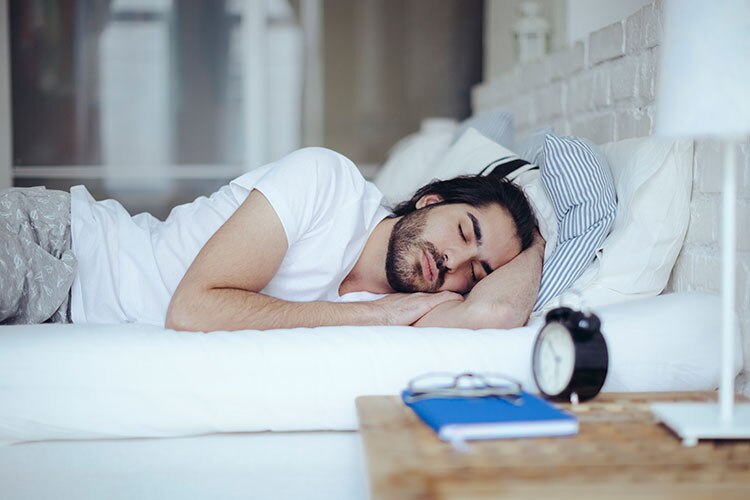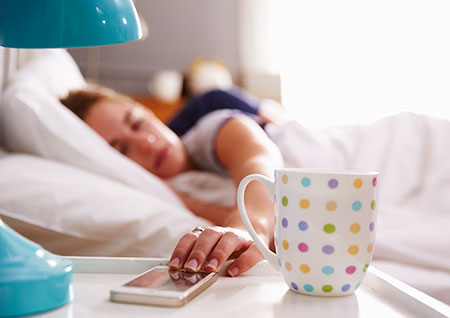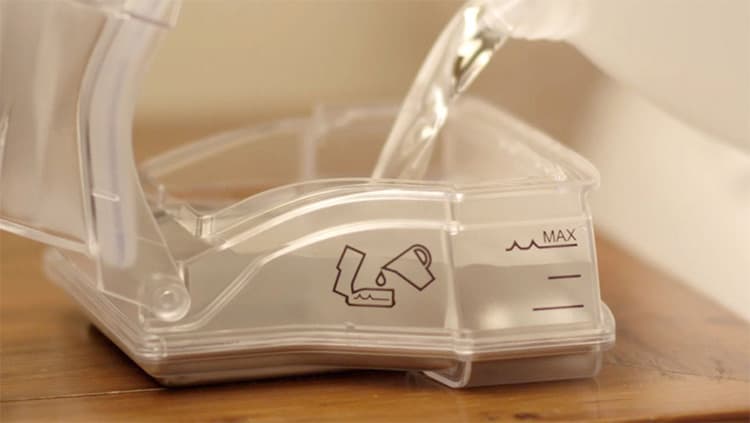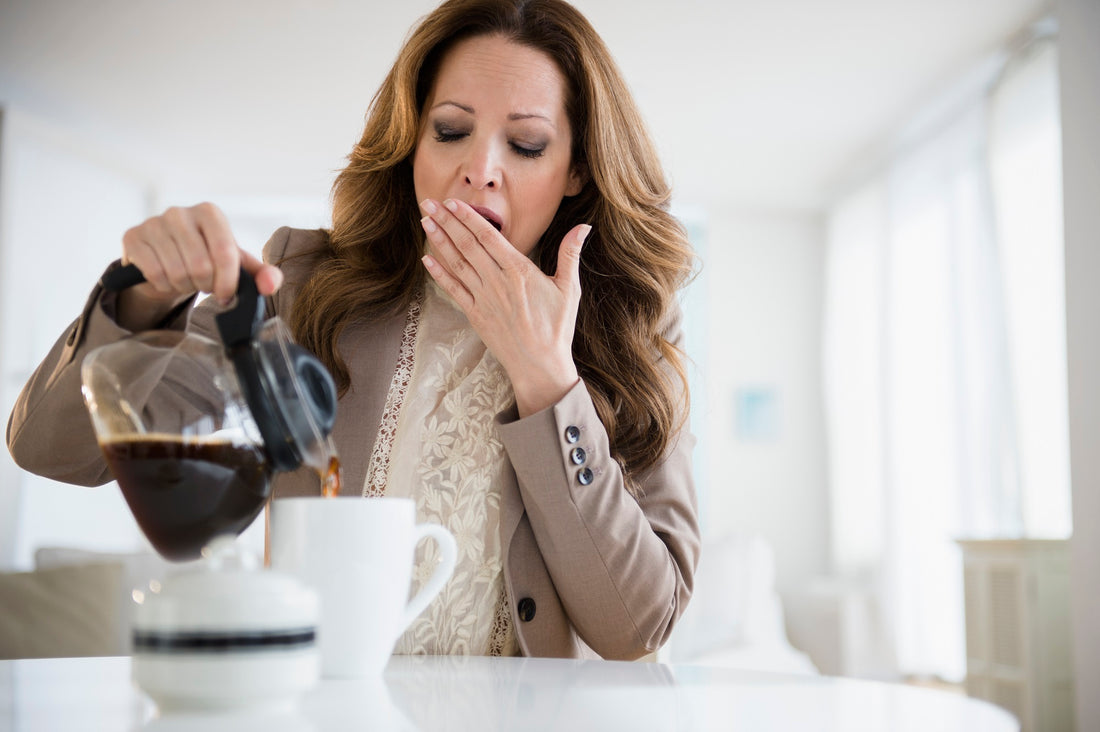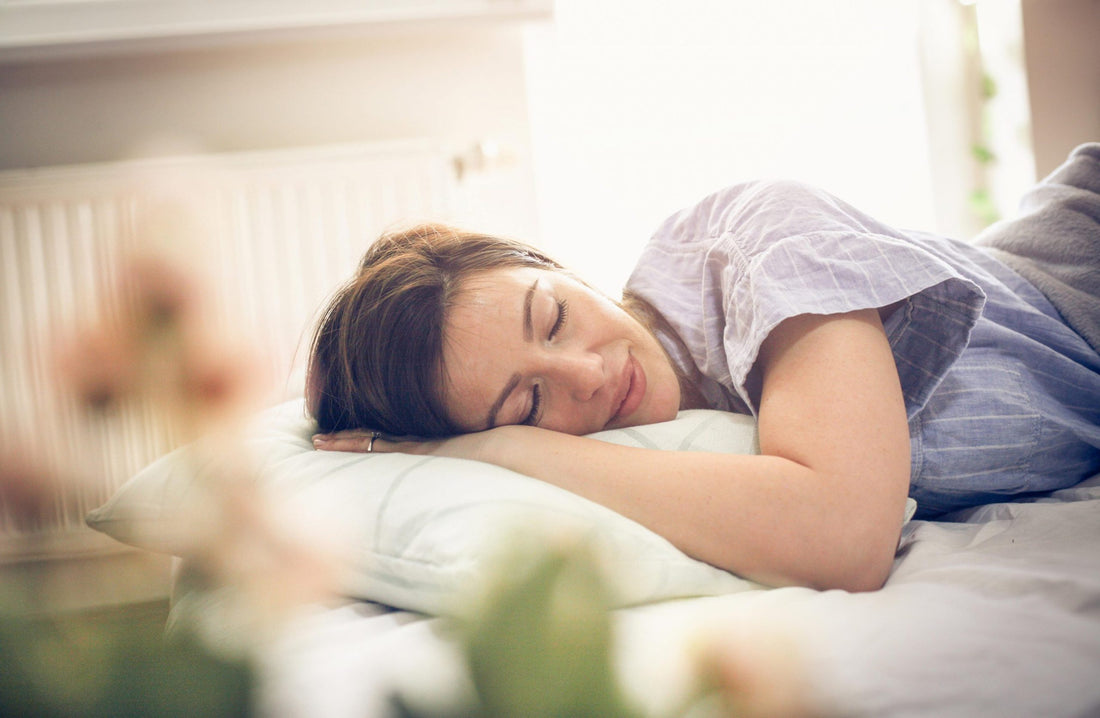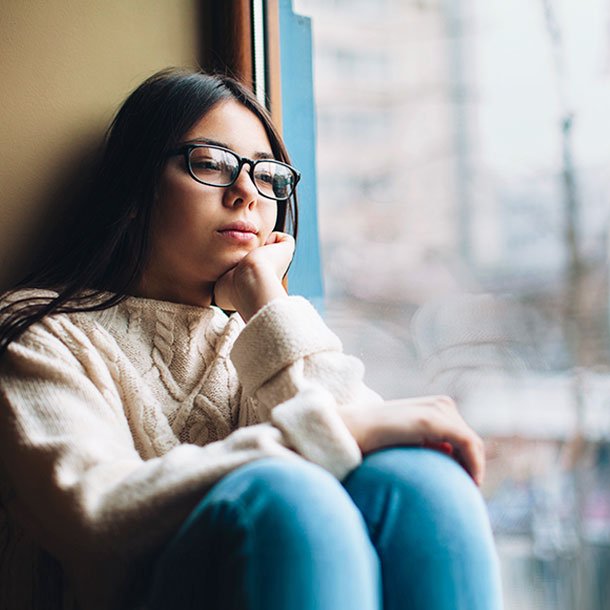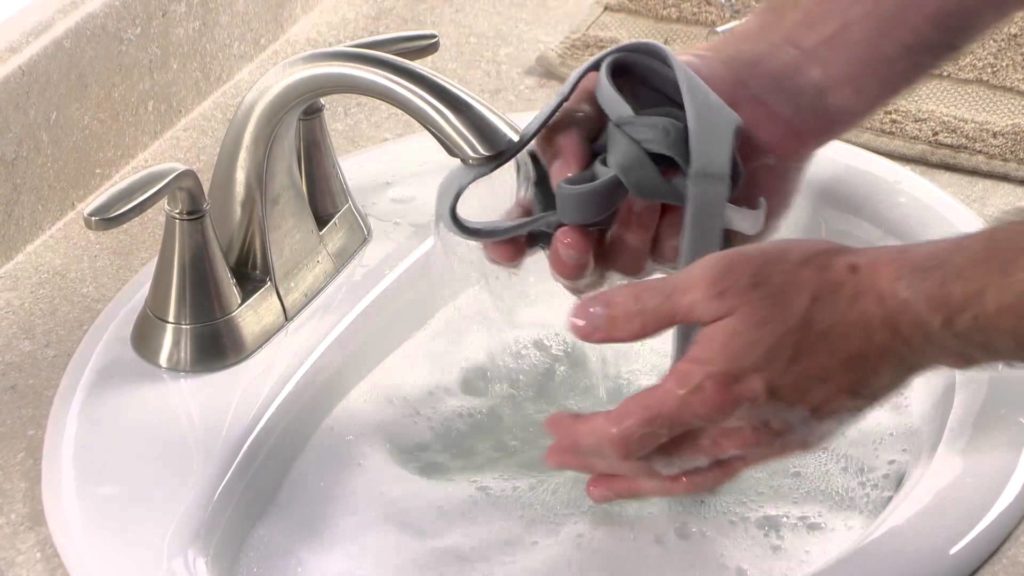News
The Connection Between Sleep and your Mood
wp:paragraph Sleep has a lot to do with your overall mood. You may already notice that nights with poor sleep can lead to you feeling irritable or stressed the following day, and nights where you sleep well lead to you feeling relaxed and happy. /wp:paragraph wp:paragraph There have been many studies done over the years linking the lack of sleep to your overall mood. Here are a few factors to consider as to how poor sleep may be affecting your mood. /wp:paragraph wp:paragraph Stress /wp:paragraph wp:paragraph Stress happens to all of us at some point, and that tends to be one of the top causes of insomnia. Stress can also cause a lack of consistency with your sleeping routine, leaving you feeling moody the following day. Finding ways to manage day-to-day stress is important. Make sure you are also practicing good sleep hygiene habits and avoiding the use of technological devices before bedtime. /wp:paragraph wp:paragraph Not getting enough sleep /wp:paragraph wp:paragraph The average adult requires around 8 hours of sleep each night, though some may perform better with closer to 9 or 10 hours. Lack of sleep tends to be a huge influence on your mood, which is why it is so important to make sure you are getting enough sleep. Make sure you keep a consistent sleeping routine that includes going to bed at the same time each night and waking up at the same time each morning. /wp:paragraph wp:paragraph Chronic Insomnia /wp:paragraph wp:paragraph Many adults suffer from chronic insomnia, which is where you have trouble falling and staying asleep at night and you may find yourself lying awake in bed for as much as several hours. There are many reasons for this; while stress is often a factor, there can be times when there is a bigger issue at hand that may require medical treatment, including night terrors, sleepwalking and untreated sleep apnea. /wp:paragraph wp:paragraph When to seek help /wp:paragraph wp:paragraph Sleep is vital to your overall mood and happiness. One night of sleep that is “off” is not generally a problem, as long as you get back on track the next day. If you have tried everything and still cannot sleep well, then it may be time to seek medical advice, especially if this is affecting your mood and/or performance during the daytime. This way you can work with your doctor to find a solution to help you sleep better. /wp:paragraph
about The Connection Between Sleep and your MoodCPAP Humidification in the Cold Months
wp:paragraph If you use a CPAP machine and you are finding yourself waking up feeling a little dry and stuffed up these days, then you are not alone. This is very common amongst CPAP users, especially in the cooler months. /wp:paragraph wp:paragraph But fear not, there are ways to fix this. Did you know that you can get a humidifier specifically for your CPAP machine? /wp:paragraph wp:paragraph How CPAP humidification works /wp:paragraph wp:paragraph The pressurized air passed throughout your CPAP device without humidification tends to be very dry and can cause your nasal passages to dry out. Especially in the cooler months, where the air is already dry, this may cause many symptoms amongst CPAP users, including dry or runny nose, chapped lips, nose bleeds, and mild sinus-type headaches. /wp:paragraph wp:paragraph Typically your nose warms up the air you breathe in general, but this is not the case when you are using a CPAP machine, because the pressurized air is passing through your nasal passages so quickly, your nose doesn’t have time to warm the air which can cause these symptoms. /wp:paragraph wp:paragraph The CPAP humidifier is an external chamber attached to the CPAP machine that gets filled up with water. While you are using the CPAP machine, the pressurized air is passed through the humidification chamber and routed through the tubing to your mask. Some newer CPAP models already come with a humidifier attached, but other times this is something you will need to purchase separately. /wp:paragraph wp:paragraph The benefits of CPAP humidification /wp:paragraph wp:paragraph There is no question that these symptoms from lack of humidification can be very uncomfortable. With the humidified air flowing through the CPAP machine, and through your nasal passages, this will prevent the dry symptoms that you may be experiencing, and provide you with a much more pleasant experience using the CPAP device. /wp:paragraph wp:paragraph Distilled water is generally recommended to use with your humidifier in order to prolong its life span. Keeping the humidifier and the tubing clean on a regular basis is also important. /wp:paragraph wp:paragraph Be sure to check out papsmart.com for CPAP humidifier options. /wp:paragraph
about CPAP Humidification in the Cold MonthsThe Connection Between Sleep and Caffeine
wp:paragraph Caffeine is not just part of your morning coffee. While a cup of joe in the morning is a part of the morning routine for many people, there is so much more to caffeine that you may not know, and believe it or not, there are many ways in that it can affect your sleep cycle. /wp:paragraph wp:paragraph The effects of caffeine on the body /wp:paragraph wp:paragraph Caffeine is a natural stimulant that is used in many food and beverages, including coffee, tea, energy drinks, sodas, and the occasional chocolate bar and nuts, though the amount of caffeine in the latter two can be extremely small and cause little to no effects. Depending on how much caffeine is in the product you are consuming, it can cause you to feel awake and alert, with the maximum effects occurring around 30-60 minutes after consumption. After that, caffeine is absorbed by your body and can stick around for 4-6 hours. /wp:paragraph wp:paragraph Most people like to have a caffeinated beverage to stay awake and alert, especially in the mornings. There is nothing wrong with that at all as long as you don’t overdo it. Too much caffeine can actually cause you to feel sleepy and have the opposite effect. And don’t forget that everyone’s limit for caffeine is different depending on many factors such as age, body weight, medical history, and personal tolerance. /wp:paragraph wp:paragraph How your sleep cycle can be affected by caffeine /wp:paragraph wp:paragraph Caffeine has been known to interfere with your circadian rhythm, which is what regulates your body’s sleep cycle. Caffeine has been known to delay the onset of sleep if you consume too much too close to bedtime, as the effects can linger in your body for up to 6 hours after consumption. If you have ever experienced insomnia from having too much coffee too close to bedtime, then you will also know that this can cause you to feel overtired and sluggish the following day. /wp:paragraph wp:paragraph For this reason, many experts don’t recommend that you consume any caffeinated beverages for several hours before bedtime. If you want to consume a beverage before bedtime, try having herbal tea or a small glass of water instead. /wp:paragraph
about The Connection Between Sleep and CaffeineAre Changes in the Weather Affecting your Sleep?
wp:paragraph Now that the weather outside is becoming cooler and the hot summer nights are behind us for another year, you may find that some of your sleep habits are a little different these days. This is completely normal. /wp:paragraph wp:paragraph Your body does a lot of work in regulating your 24-hour sleep-wake cycle and the temperature outside actually has more of an effect on your sleep than you may think. Regulating your body temperature while sleeping is incredibly important for a good sleep overall, but all of the changes in the weather can affect your internal clock and melatonin production more than you think. Here are a few ways that you may find your sleep is affected by the weather. /wp:paragraph wp:paragraph Cooler nights /wp:paragraph wp:paragraph Now that fall is officially here, so are the cooler nights. While experts recommend slightly cooler temperatures for sleeping in general, it is important to find a happy medium. You don’t want to find yourself so cold that you are shivering or uncomfortable. Don’t be afraid to put the heat on at night or put on an extra layer just to be comfortable while sleeping. /wp:paragraph wp:paragraph Shorter Days /wp:paragraph wp:paragraph Now that it gets darker earlier, you may find you are either feeling tired earlier, or you are having trouble sleeping. Seasonal Affective Disorder (SAD) is also common around this time thanks to the shorter hours of sunlight. Sticking to a regular bedtime and getting as much sunlight as you can during the daytime will help with this. Make sure you are also getting regular exercise in as well. /wp:paragraph wp:paragraph Changes in air pressure /wp:paragraph wp:paragraph If you are finding yourself waking up with mild headaches, body aches, or very minor cold-like symptoms, you are not alone. Whenever there is a change in barometric pressure (which is the change in the weight of the air that occurs whenever there are drastic weather changes) it can take your body some time to adjust. Fatigue is extremely common because of this, as are the symptoms mentioned above. Just know that this will pass, and make sure you practice good sleep hygiene to help with this. /wp:paragraph
about Are Changes in the Weather Affecting your Sleep?Sleep Tips for Thanksgiving
wp:paragraph Canadian Thanksgiving is coming up in just a few short days. Maybe you are planning on gathering with loved ones and eating a big dinner complete with turkey and pumpkin pie. Or perhaps you are keeping the celebrations low key this year, but still plan on indulging in a delicious meal. /wp:paragraph wp:paragraph Whatever your plans are, it is important to note that many people experience disruptions in their sleep around Thanksgiving. This is caused by many things including over-eating, drinking too much, or a disruption in your routine from traveling and/or gathering with other people. Here are a few tips for getting a good night’s sleep during Thanksgiving. /wp:paragraph wp:paragraph Pace yourself at dinner: Over-eating is very common at Thanksgiving, and there are many people who find themselves unable to sleep as a result. After all, the food is just too delicious! But eating too much can cause insomnia and other sleeping problems. Keep your portions on the smaller side and stop eating when you feel full. /wp:paragraph wp:paragraph Keep your nap short: While turkey has been known to make people feel sleepy, it may not necessarily be the only reason you may have an urge to nap after the big meal. Digesting a large meal can take a lot of energy, which may have you feeling the need to nap during the day. If you absolutely need to take a nap, keep it under 30 minutes and try and do so earlier in the day, so that it doesn’t interfere with bedtime. /wp:paragraph wp:paragraph Limit alcohol: Many people tend to drink alcohol a little more than normal at Thanksgiving. There is nothing wrong with indulging in a few beverages but be smart about it. Drinking too much can interfere with your sleep cycle and cause a restless night. Enjoy a beverage or two but drink water throughout the day to help you stay hydrated. /wp:paragraph wp:paragraph Get exercise: A walk after dinner can not only promote family bonding time, but it can also help to promote good digestion to help you sleep better. Exercise also helps your body’s internal clock to wind down once it is bedtime. /wp:paragraph
about Sleep Tips for ThanksgivingHow Seasonal Affective Disorder Disrupts your Sleep
wp:paragraph Seasonal Affective Disorder (otherwise known as SAD) is a form of depression that typically occurs each year around the time when the seasons' transition. A lot of this is because of the shorter hours of sunlight, which can lead to a hormonal imbalance. This is extremely common in the fall months, and lots of people are finding that their sleep habits are being affected by SAD. /wp:paragraph wp:paragraph How SAD can affect your sleep /wp:paragraph wp:paragraph A few of the common symptoms of SAD include mood swings, anxiety, sadness, decreased interest in activities, and social withdrawal. SAD can also affect your sleep in many ways as reduced sunlight can disrupt your biological clock, which in turn can affect your sleep cycle. Many SAD patients find themselves experiencing insomnia or restless nights, or they are sleeping for longer than normal. This can also affect how you function during the daytime and can lead to difficulty concentrating, feeling sluggish or tired, and having low energy. /wp:paragraph wp:paragraph How SAD patients can get a better sleep /wp:paragraph wp:paragraph If your SAD symptoms have reached the point where your mood is down for as much as several days, you have no motivation to do activities you normally enjoy, or your sleep patterns have changed drastically, then you should speak to your doctor for further treatment. They may recommend medication, cognitive behavioral therapy, or light therapy. /wp:paragraph wp:paragraph A few other ways that you can get better sleep without medical intervention include maintaining the practice of good sleeping habits; stick to the same bedtime, keep your bedroom an inviting place to sleep, and limit the use of technology before bedtime. You can also try taking melatonin before bedtime to help reset your sleep cycle. Keeping up with good habits during the daytime, including a healthy diet and exercise, can also be helpful. /wp:paragraph wp:paragraph Finally, get outside! Go for a walk in the daytime before it gets dark. Getting in some sunlight can be extremely beneficial to your internal clock. /wp:paragraph
about How Seasonal Affective Disorder Disrupts your SleepIs Smoking Making your Sleep Worse?
wp:paragraph You probably know that smoking cigarette can have a negative impact on your overall health, but did you know that smoking can be the cause of many sleep problems for adults? /wp:paragraph wp:paragraph The effect of smoking cigarettes on sleep /wp:paragraph wp:paragraph Smoking cigarettes can not only affect your body’s internal clock in a negative way, but it can also raise your risk of developing sleep apnea and can also cause your sleep to be fragmented, meaning your overall sleep is restless, or you experience insomnia. /wp:paragraph wp:paragraph This is because of nicotine, which is the active ingredient found in cigarettes. Nicotine has been known to have a stimulating effect, but not one that is beneficial for sleeping. Cigarette smoking has been known to temporarily reduce anxiety and help people to feel more awake and alert. This is, however, a temporary effect, which is not exactly beneficial for getting a well-rested sleep at night. /wp:paragraph wp:paragraph For this reason, doctors typically advise against smoking if patients are experiencing sleep problems. /wp:paragraph wp:paragraph If you are planning on quitting smoking /wp:paragraph wp:paragraph Quitting smoking is not easy and can take some time. It is best to speak to your doctor if you plan on quitting smoking, as they can help you come up with a plan that works best for you and your overall health. /wp:paragraph wp:paragraph While the process of quitting smoking may be frustrating, it is important to remember that the long-term effects can be extremely beneficial for your sleep. In fact, sleep apnea patients who quit smoking after being diagnosed have reported substantial improvements in their sleep quality from quitting smoking. /wp:paragraph wp:paragraph Don’t expect your sleep to improve right away. Typically, the first few days of quitting can have some unpleasant side effects, and the withdrawal symptoms can continue towards the evening hours when it’s time for bed. Be prepared for the fact that you may experience a few sleepless nights in addition to the cravings and irritability. Make sure you surround yourself with a good support system, practice good sleep hygiene, and be patient. /wp:paragraph
about Is Smoking Making your Sleep Worse?Is your Mattress Hurting your Sleep?
wp:paragraph If you are having trouble sleeping at night, your mattress may be to blame. /wp:paragraph wp:paragraph Since we do spend about a third of our life sleeping, skimping out on the quality and comfort of your mattress is not something you want to do! According to experts, the surface in which you sleep can have a huge impact on the overall quality of your sleep. /wp:paragraph wp:paragraph How to know when it’s time to replace your mattress /wp:paragraph wp:list If your mattress is older than 8-10 years. This is the general life span for most mattresses If you are waking up with any sort of chronic pain of soreness in your body If you are tossing and turning more than normal throughout the night If your mattress is lumpy or beginning to sag /wp:list wp:paragraph Tips for finding the right mattress /wp:paragraph wp:list Find one with the firmness that works for you: most mattresses come in firm, medium and soft. Which one works best for you will depend on your primary sleeping position, comfort level and how it caters to the pressure points on your body. Test the mattress out in person before making the purchase. Don’t just sit on it for a few seconds. Take a few minutes to lie down in the position you normally sleep in and roll around a few times, just to make sure it’s a good fit. If you are not able to try out the mattress before buying it, make sure there is a sufficient return policy, just in case it ends up not working out If you and your partner will be using this mattress, make sure it is a good fit for both of you. Most newer spring mattresses have individual coils, which means if one of you moves, the whole mattress won’t move with it. Give yourself time to adjust! It may not feel absolutely perfect the first night, most mattress companies have a warranty of at least a few months after purchase. /wp:list
about Is your Mattress Hurting your Sleep?Getting your CPAP Ready for the Fall Season
wp:paragraph Now that the weather is slowly starting to transition into the cooler fall temperatures, the nights are now getting cooler. The fall can be a fantastic time to make sure your CPAP machine is in perfect working condition. This is to ensure your sleep apnea is being treated and you have a good night’s sleep without any interruptions. /wp:paragraph wp:paragraph Here are a few ways to get your CPAP machine ready for the fall months; /wp:paragraph wp:paragraph Give your CPAP a deep clean /wp:paragraph wp:paragraph While cleaning your CPAP machine is recommended on a regular basis, doing a deep clean every so often can be extremely beneficial and can extend the life of some of the parts to your CPAP machine. It is best to clean the CPAP parts in the morning and leave them out to air dry so they are clean and dry once it’s time for bed. Do not leave any parts in direct sunlight and do not use bleach to clean your CPAP. /wp:paragraph wp:paragraph Take inventory of your CPAP parts /wp:paragraph wp:paragraph The fall can be an excellent time to take inventory on any parts that may be starting to wear down. Many items such as the mask cushions, tubing, headgear, and/or chin straps (if applicable) do have a life span. If you find these are starting to wear down, then now is the perfect time to be replacing these parts. It is also helpful to check the machine itself; if the cords are starting to wear down or the machine is not working to its full potential, you may need to think about replacing it. Check out www.papsmart.com for any CPAP parts you need. /wp:paragraph wp:paragraph Double-check the CPAP humidifier /wp:paragraph wp:paragraph Now that the nights are cooler, you may find yourself making use of the humidifier more often than before. Be sure to check the humidifier filters at least once a week. If they are dirty or discolored, then it is time to replace them or clean them (if they are not disposable). The humidifier can be a fantastic addition to your CPAP, especially in the cooler months, so it is important to make sure it is in perfect working condition. /wp:paragraph
about Getting your CPAP Ready for the Fall Season